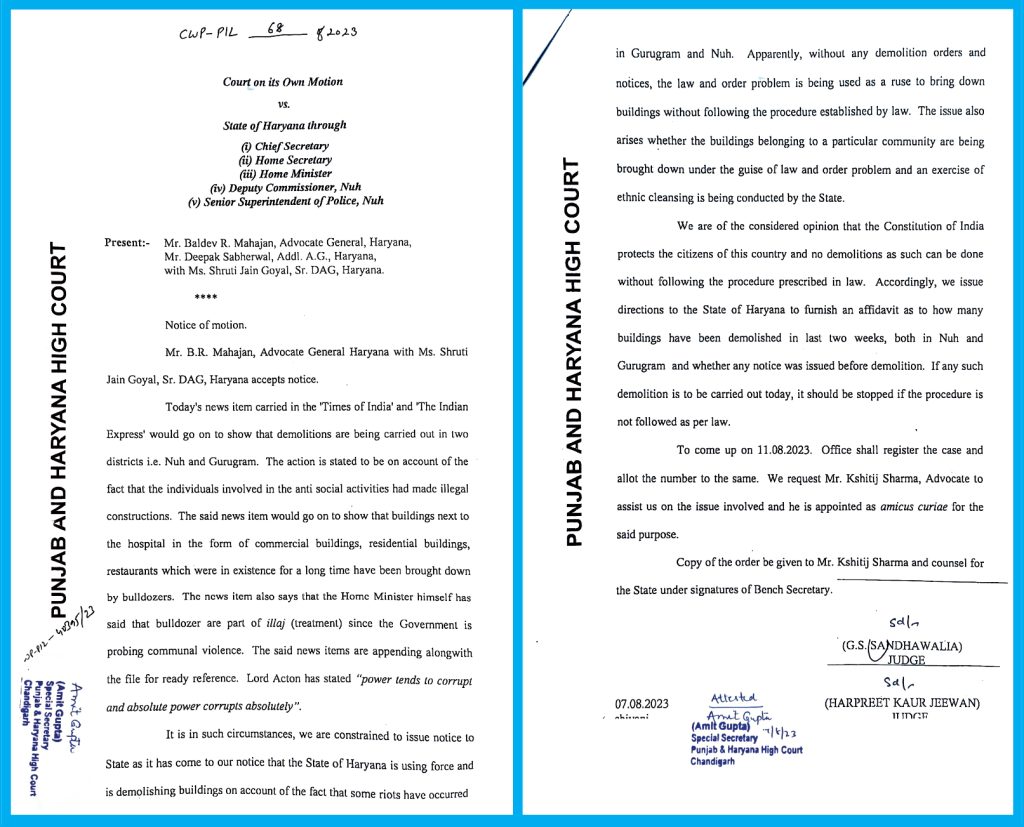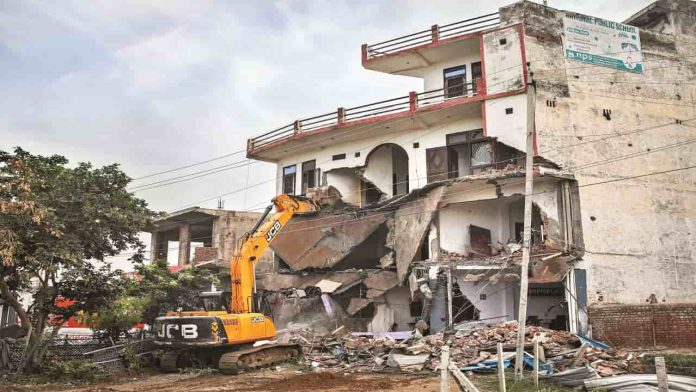By Sujit Bhar
When you build a house for yourself and your family, you build it not just with money, but with a great deal of your heart. Similarly, when you set up a small business, you nourish it and take care of it as you would your child. These are not just material possessions, but are veritable extensions of you. That is why the right to property was once a fundamental right in this country.
Today, it may just be a constitutional and a human right, but still nobody builds a house and calls it a mere property. It is still called a home. And when one sets up a small shop for his/her livelihood, that’s not just a business; it is Lakshmi. And this applies as much to saints, as it applies to sinners.

So, when the government simply mows down your home and your Lakshmi, just because there is an unconfirmed suspicion that you might have been complicit in a crime, it not only violates your right or your faith, it violates your humanity.
Bulldozer justice is being practised for a while in certain parts of India, with the latest being Nuh in Haryana, all without any court order. For the time being this has been stopped because of a fine order of the Punjab and Haryana High Court. The Court, on its own motion, has interfered and has managed to put a stop to this senselessness.
The issue is complex. Property, whether it is a house or landed property or maybe even a small shop or roadside kiosk, is possibly the biggest investment that a person makes in his/her lifetime. And he/she does this, because these are as dear to a person’s heart as his/her family is. These are places where he finds shelter from the sun and rain and these are places with the help of which he/she manages to feed his/her family. These are places where his/her heart beats.
An indelible right
Almost naturally, the idea of owning property and a citizen’s right to it, was a fundamental right. It ceased to be so in 1978 with the introduction of Article 300-A in the Constitution of India. That changed the complexion of this right from a fundamental right to a constitutional and human right. Yet, the fact is that it remains an indelible right for any citizen of India. That is the position of law, and such rights can only be taken away through the intervention of the law.
Within this comes the recent spate of bulldozing of houses, hutments, places of business, such as shops of people who have been deemed to be criminals by the government. They come within hours of a criminal act, a riot and well before even any FIR has been lodged, or even before the first word has been written on the chargesheet.
Such actions are extremely popular with the public, the voters, and any administration/political party would be only too willing to keep them happy. Bulldozing of property in Uttar Pradesh, still, wore a thin veneer of political logic, in that much of the property demolished actually belonged to convicted criminals.
Take the case of gangster-turned-politician Atiq Ahmed, who, along with his brother Ashraf was openly shot dead by miscreants in front of the police and media. It has been reported that since September 2020, the Prayagraj Development Authority (PDA) has demolished six buildings that belonged to Atiq, including his house and office. According to officials two of these buildings had been constructed on government land.
According to a senior PDA official “due process was followed before the demolitions”. It has been said that “notice was issued to Atiq Ahmed (deceased),” and no family member had come forward. That was the thin veneer of “legality”.
If you turn to the houses and shops demolished by the Nuh administration in Haryana recently, after severe communal riots, even that veneer was not visible. Law itself wasn’t important, leave alone constitutional and human rights.
The authorities demolished 94 houses and 212 other structures in the last two days, taking the total number of buildings razed by the authorities to more than 750 in just over a week. That would have affected way more than 750 persons, and yet the law was kept at arm’s length.
How did the authorities’ choice of houses and shops converge on those 750-odd? Had the owners been identified? Had their criminal complicity been proven beyond doubt by any court of law and had any magistrate signed off on any order of demolition? It has already been reported in the media that one person who had actually sheltered and kept three Hindu persons safe suddenly found his house being destroyed by bulldozers a week later. The mistake was found through hectic phone calls from those rescued, but by then his house was almost gone.
The big question in this is whether bulldozing of one’s property actually reduces criminal activity. Read the accompanying piece, Crime As Punishment for interesting details.
Invigorating news
In this midst, comes a very invigorating piece of news. The Punjab and Haryana High Court on its own motion, has interfered and has managed to put a stop to this senseless act of bulldozing property.
Here is the gist of what the Court said in its order:
“Today’s news item carried in the ‘Times of India’ and ‘The Indian Express’ would go on to show that demolitions are being carried out in two districts i.e. Nuh and Gurugram. The action is stated to be on account of the fact that the individuals involved in the anti-social activities had made illegal constructions. The said news item would go on to show that buildings next to the hospital in the form of commercial buildings, residential buildings, restaurants which were in existence for a long time have been brought down by bulldozers.
“The news item also says that the Home Minister himself has said that bulldozers are part of illaj (treatment) since the Government is probing communal violence… Lord Acton has stated ‘power tends to corrupt and absolute power corrupts absolutely’.
“It is in (sic) such circumstances, we are constrained to issue notice to State as it has come to our notice that the State of Haryana is using force and is demolishing buildings on account of the fact that some riots have occurred in Gurugram and Nuh. Apparently, without any demolition orders and notices, the law and order problem is being used as a ruse to bring down buildings without following the procedure established by law. The issue also arises whether the buildings belonging to a particular community are being brought down under the guise of law and order problem and an exercise of ethnic cleansing is being conducted by the State.
“We are of the considered opinion that the Constitution of India protects the citizens of this country and no demolitions as such can be done without following the procedure prescribed in law. Accordingly, we issue directions to the State of Haryana to furnish an affidavit as to how many buildings have been demolished in last two weeks, both in Nuh and Gurugram and whether any notice was issued before demolition. If any such demolition is to be carried out today, it should be stopped if the procedure is not followed as per law.”
The issue comes up for hearing soon and one has to understand the court’s consternation in having to pass such an order in the midst of busy days. Human rights are not something you just deny at your will.


